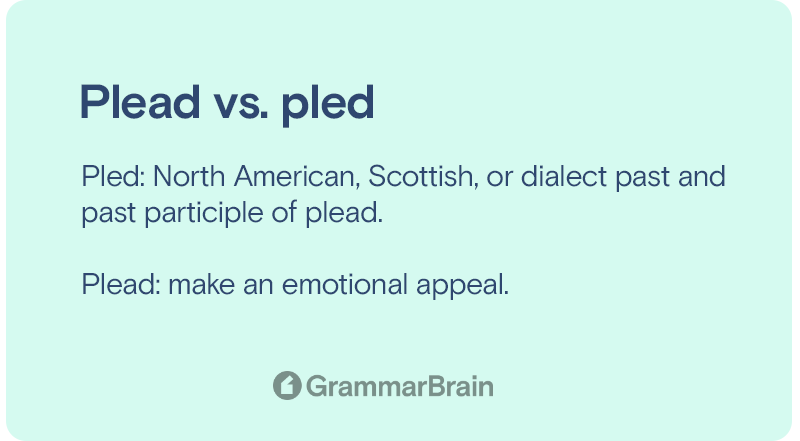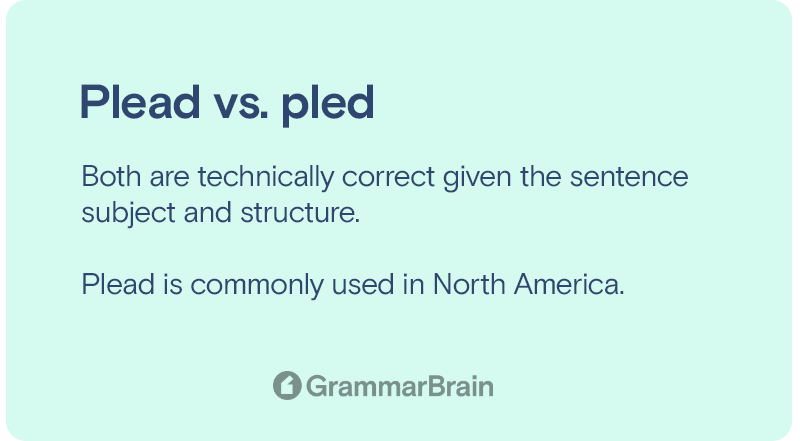What is the past tense of plead? Is it pleaded? Or plead? There are things in the world for which we plead but never receive. For some, clarification on the distinction between pled and pleaded, or whether one of these forms should be avoided entirely, is one of these things.
Today, let’s learn the correct past tense of the verb “plead.”

What is the past tense of the verb “plead”?
The past tense of the verb ‘to plead’ is highly contentious. Because it is available in two forms, pleaded and pled. Each of these is accurate.
What then? The answer varies largely on who you ask. Let us first define the terms pleaded and pleaded.
| Word | Definition |
| Plead | make an emotional appeal. |
| Pled | North American, Scottish, or dialect past and past participle of plead. |
What does it mean to plead?
The verb plead is to passionately appeal or entreat. It is frequently used when referring to the law and the court, as in to allege or present formally in an action at law.
This relationship with the court stretches back to the genesis of the word since plead was first recorded in 1200–50 and derives from the French plaidier.
The related term plea is significantly older, recorded between 1175 and 1225, and derived from the French plaid. Both plead and plea have their origins in the Latin verb placere, which means “to please.”
The mistake with pled arises when the past tense of pled is considered. As advised by style guides such as The AP Stylebook and The Chicago Manual of Style, the formal past tense is used.
Since many reputable news sources adhere to one of these two style rules, you are most likely to encounter the past tense form pleaded in the news.
In the United States’ highest court, pleaded is also the most common term. In court and in everyday speech, however, do not be startled to encounter pled.

What does it mean to pled?
Pled, which has the same meaning as pleaded, is the informal alternative to the formal past tense pleaded. Who uses the word and how they use it varies, though.
The AP Stylebook describes pleaded as the informal past tense, although the Chicago Manual of Style categorizes pleaded for fair use and pled for common use.
This is not the only thing that influences the usage of pleaded and pled. In British English, the formal pleaded is more prevalent, whereas pled is more prevalent in Scottish and American English.
The verb plead has two past tenses, why?
The original form of the past tense is pled. However, English speakers have a propensity for hypercorrection or correcting words that do not require correction.
In general, both pleaded and pled are acceptable despite their distinctions. There is, after all, a reason why the dictionary definition of plead includes both versions in the past tense.
So, what shall we use? Pled or Pleaded?
According to Oxford Dictionaries, pleaded is the North American, Scottish, and dialect-specific past tense of plead.
The dictionary lists both forms. Both phrases are used equally in the lawful society, which appears to be extremely invested in the argument due to the widespread use of the verb plead in legal vocabulary.
Even though the outcome of the dispute may not be as consequential as it has been for other grammar issues, there is still much debate regarding the correct phrase.
However, pleaded is the frequently accepted past tense of plead, and pled is the form that can sometimes be used in its place, particularly in the North American and Scottish legal systems.
FAQs
1. What is the distinction between the words plead and pleaded?
The past tense of the verb plead, which can mean to beg or to assert guilt or innocence in a legal context, is plead.
2. What is the past tense of the verb ‘to plead?’
The past tenses of the verb plead are pled and pleaded. Both are considered correct. The sole distinction is the context of their usage.
3. How to use the word plead in a sentence?
- Jason pled guilty but the judge did not accept his plea.
- Although four people pled guilty to the crime, the judge dropped charges for all of them.
4. Should you plead or state your case?
The proper procedure is to argue your point. This is to present one’s case or charge-related argument in a court of law.
5. What is an example of the past participle form?
For example, “Someone pled guilty.”
6. Is the word “pled” the colloquial past tense form of the word plead?
Yes. It’s advised not to use that version of the word, instead, “Plead guilty” is better. Not “Pleaded guilty” (incorrect).
7. What is the present tense of the word form?
Plead. For example, “I plead not guilty.” Which relates to the definition of “serious and emotional appeal.”
Sources
- Pleaded or Pled?
- Pleaded vs. pled
- The case of “pleaded” v. “pled”
- “Pled” vs. “Pleaded”: Which One Should You Use?
Inside this article
Fact checked:
Content is rigorously reviewed by a team of qualified and experienced fact checkers. Fact checkers review articles for factual accuracy, relevance, and timeliness. Learn more.
Core lessons
Glossary
- Abstract Noun
- Accusative Case
- Anecdote
- Antonym
- Active Sentence
- Adverb
- Adjective
- Allegory
- Alliteration
- Adjective Clause
- Adjective Phrase
- Ampersand
- Anastrophe
- Adverbial Clause
- Appositive Phrase
- Clause
- Compound Adjective
- Complex Sentence
- Compound Words
- Compound Predicate
- Common Noun
- Comparative Adjective
- Comparative and Superlative
- Compound Noun
- Compound Subject
- Compound Sentence
- Copular Verb
- Collective Noun
- Colloquialism
- Conciseness
- Consonance
- Conditional
- Concrete Noun
- Conjunction
- Conjugation
- Conditional Sentence
- Comma Splice
- Correlative Conjunction
- Coordinating Conjunction
- Coordinate Adjective
- Cumulative Adjective
- Dative Case
- Determiner
- Declarative Sentence
- Declarative Statement
- Direct Object Pronoun
- Direct Object
- Diction
- Diphthong
- Dangling Modifier
- Demonstrative Pronoun
- Demonstrative Adjective
- Direct Characterization
- Definite Article
- Doublespeak
- False Dilemma Fallacy
- Future Perfect Progressive
- Future Simple
- Future Perfect Continuous
- Future Perfect
- First Conditional
- Irregular Adjective
- Irregular Verb
- Imperative Sentence
- Indefinite Article
- Intransitive Verb
- Introductory Phrase
- Indefinite Pronoun
- Indirect Characterization
- Interrogative Sentence
- Intensive Pronoun
- Inanimate Object
- Indefinite Tense
- Infinitive Phrase
- Interjection
- Intensifier
- Infinitive
- Indicative Mood
- Participle
- Parallelism
- Prepositional Phrase
- Past Simple Tense
- Past Continuous Tense
- Past Perfect Tense
- Past Progressive Tense
- Present Simple Tense
- Present Perfect Tense
- Personal Pronoun
- Personification
- Persuasive Writing
- Parallel Structure
- Phrasal Verb
- Predicate Adjective
- Predicate Nominative
- Phonetic Language
- Plural Noun
- Punctuation
- Punctuation Marks
- Preposition
- Preposition of Place
- Parts of Speech
- Possessive Adjective
- Possessive Determiner
- Possessive Case
- Possessive Noun
- Proper Adjective
- Proper Noun
- Present Participle
- Prefix
- Predicate



